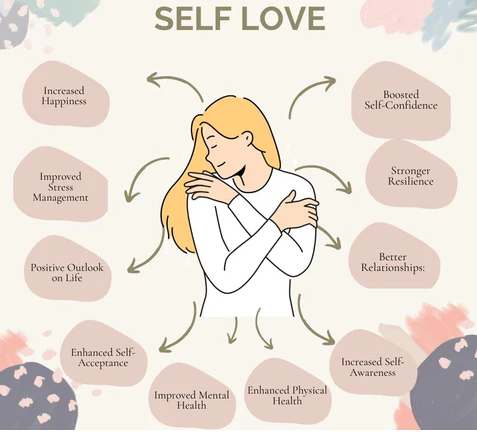The Importance of Self-Love and How to Practice It
In a world that constantly demands more from us—whether it’s at work, in relationships, or through societal expectations—self-love is often neglected. Yet, it is one of the most essential components of a fulfilling and balanced life. Without selflove, we may struggle with self-doubt, low self-esteem, and even burnout. Cultivating self-love allows us to build confidence, set boundaries, and embrace our authentic selves.
Why Self-Love Matters
Self-love isn’t about arrogance or self-centeredness; it’s about appreciating yourself and recognizing your worth. When we practice self-love, we:
- Develop a stronger sense of self-worth
- Improve our mental and emotional well-being
- Set healthy boundaries in relationships
- Foster resilience in the face of challenges
- Enhance our overall happiness and fulfillment
Loving yourself sets the foundation for healthy relationships, success, and overall well-being. If we don’t prioritize self-love, we risk seeking validation from others or engaging in self-sabotaging behaviors.
Practical Ways to Practice Self-Love
If you’re unsure where to start, here are some practical steps to help you cultivate self-love:
1. Practice Self-Compassion
We often extend kindness to others but fail to treat ourselves with the same gentleness. Self-compassion means acknowledging that it’s okay to make mistakes and embracing yourself with kindness rather than harsh criticism.
2. Set Healthy Boundaries
Saying no when necessary and protecting your energy is a crucial aspect of self-love. Establish boundaries that prioritize your mental and emotional well-being, whether it’s at work, in friendships, or within your family.
3. Prioritize Self-Care
Self-care is an essential part of loving yourself. This can include simple practices such as getting enough sleep, eating nutritious foods, engaging in physical activity, or indulging in hobbies that bring you joy.
4. Surround Yourself with Positive Influences
The people we interact with impact our self-perception. Spend time with those who uplift and support you rather than those who drain your energy or make you feel inadequate.
5. Challenge Negative Self-Talk
Our inner dialogue significantly influences our self-esteem. Replace negative self-talk with affirmations and positive reinforcement. Instead of saying, “I’m not good enough,” remind yourself, “I am worthy and capable.”
6. Celebrate Your Achievements
Take time to acknowledge your progress, no matter how small. Celebrate your wins and recognize your strengths rather than focusing solely on what needs improvement.
7. Engage in Mindfulness and Gratitude
Practicing mindfulness helps you stay present and appreciate yourself in the moment. Similarly, gratitude shifts your focus to the positive aspects of your life, reinforcing a sense of contentment and self-worth.



